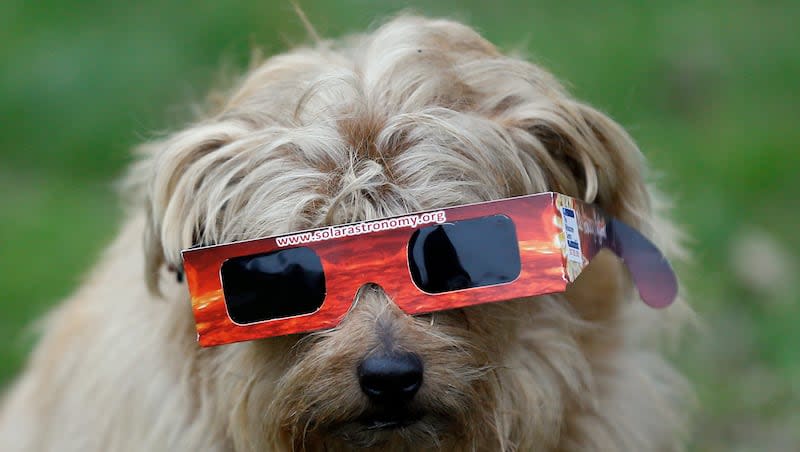How to keep your pets safe during a solar eclipse

The total solar eclipse is almost here. Did you make plans for your pets?
While most dogs and cats will be able to have a perfectly normal day Monday, there are a few potential issues you should watch out for.
Does the solar eclipse affect dogs?
Dogs and other household pets may be unusually anxious Monday, but it won’t be because of the sky going dark at midday, according to vets and scientists.
Their anxiety will instead stem from their owners’ eclipse-related behaviors. They’ll sense the excitement in the air and potentially react negatively to it.
“Any unusual human behavior can disturb pets,” The New York Times reported.
That’s one reason why it’s probably best to leave your dog at home if you plan to go to an eclipse-viewing party. Away from the crowds and activity, pets will be able to have a normal day.
“They’re going to be better off at home, in their normal environment,” said Rena Carlson, president of the American Veterinary Medical Association, to NPR.
How to keep pets safe during solar eclipse
Here are some pet safety tips for the eclipse from NPR’s coverage:
If possible, leave your pets at home so that they can have a quiet day away from crowds.
If your pets are part of your eclipse festivities, monitor their anxiety levels. Signs of distress in dogs including whining and pacing.
If your dog comes with you on an eclipse-related trip, bring extra food and water. You may end up stuck in traffic for much longer than you anticipate.
If you live in the path of totality or close to it, eclipse-related traffic may affect your ability to get to the vet in case of emergency. Plan alternate routes in advance.
Are there eclipse glasses for dogs?
Note that the list of safety tips does not include perching eclipse glasses on your pet’s face.
Dogs — and animals in general — don’t need the special glasses because, unlike humans, they won’t be intently staring at the sun.
“They’re outside every day and don’t look up at the sun, so there’s no reason to think they’re going to do that at this point,” Carlson told NPR.
Adam Hartstone-Rose, a professor of biological sciences at North Carolina State University, offered a similar assessment to The New York Times.
“As a fashion statement, I’m all for it, so go for it,” he said. “But as a safety precaution, no, that’s not something they need to do. Animals do not look at the sun.”
Animal research during solar eclipse
Although dogs, cats and other household pets are not expected to act too oddly during Monday’s solar eclipse, Hartstone-Rose and other scientists are encouraging people to pay attention to animal behavior in case something unexpected happens — and report back.
Some zoos in the path of totality are playing host to large-scale research projects on animal behavior during an eclipse, which involve scientists, zoo workers and volunteers tracking behaviors before, during and after Monday’s eclipse.
Hartstone-Rose has set up one such project at the Fort Worth Zoo in Texas, according to The New York Times.
He ran a similar study in Columbia, South Carolina, during the 2017 eclipse and found that around three-quarters of the observed species at the zoo displayed some sort of behavior change.
“Many of those animals (thought) that the change in light meant it was time to prepare for bed. A smaller group of animals, including the giraffes, baboons, gorillas, flamingoes, lorikeets (a type of parrot) and one Komodo dragon showed behavior that was out of the ordinary and could be interpreted as anxiety,” The New York Times reported.

